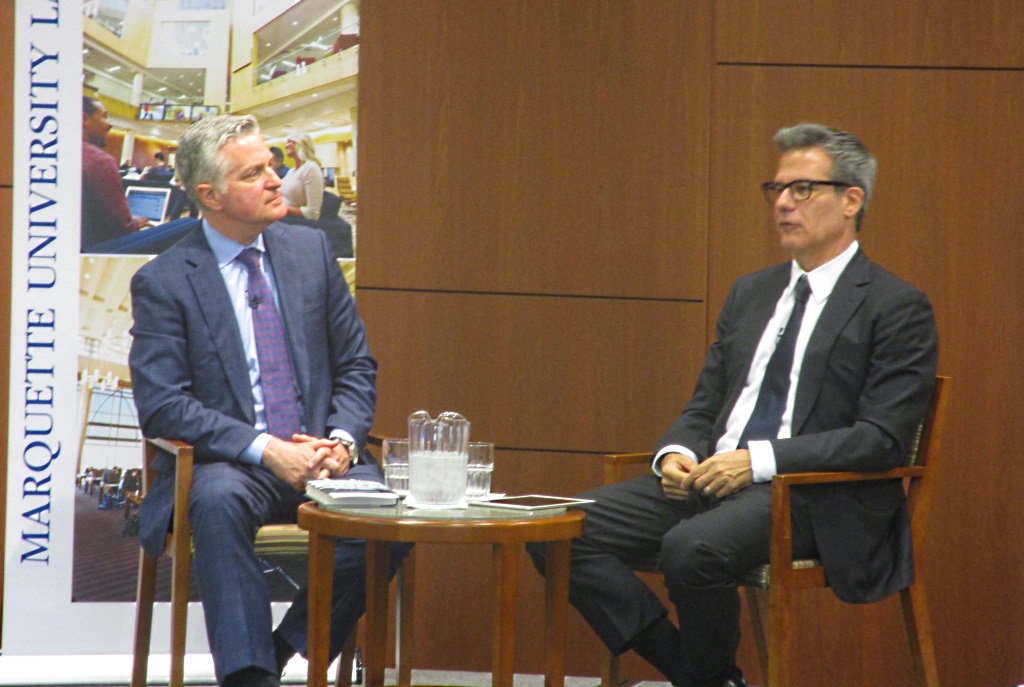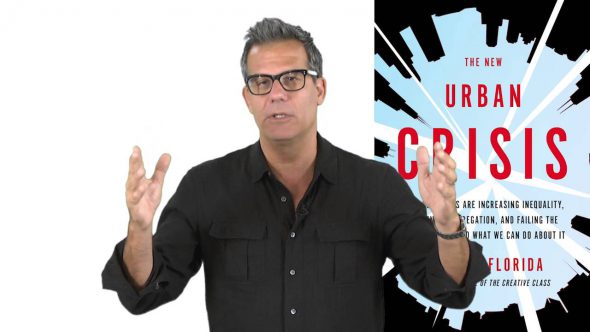The Good and Bad of Urbanism
Richard Florida drops by Marquette University to discuss his latest book, “The New Urban Crisis.”
Richard Florida became synonymous with urbanism a decade-and-a-half ago when he wrote a largely upbeat book, “Rise of the Creative Class,” about the renaissance taking place in major cities across the globe.
In his latest literary work, Florida, director of the Martin Prosperity Institute at the University of Toronto and a global research professor at New York University, has taken a more sobering look at some of the challenges facing urbanism.
Florida discussed the components of his recently published book, “The New Urban Crisis,” at Marquette University on Thursday. Florida spoke with Mike Gousha for his On the Issues series. Several hundred people attended the event.
Throughout his hour-long talk, Florida referenced a self-coined phrase: “winner-take-all urbanism.”
For all of the positive buzz about urban revival, Florida said new challenges have grown alongside the trend, including a reduction in the middle class and an overall rise in inequity among various demographic and class groups.
Although there are common threads in the challenges major cities face, Florida said there is not a cookie-cutter blueprint to solving issues from one urban center to the next.
“Every community is different,” he said. “What works best in one city won’t work in another.”
When it comes to the shifts that have brought people back into the cities, Florida said there is much to celebrate. “We’ve seen an urban revival on steroids,” he said as he described the trend in Milwaukee and elsewhere.
Florida recalled an encounter he had years ago with then-Mayor John Norquist during a stop in Milwaukee. One of the long-range visions that stood out in Florida’s mind were the improvements along the Milwaukee River.
“Milwaukee has done a fabulous job of reinventing itself,” Florida said. “You don’t have the level of urban crisis (in some cities) … but the signals are still there. You have to deal with it.”
In “The New Urban Crisis,” Florida incorporated research from a number of scholars and touched on such data as a so-called crisis index that looks into some of the challenges major urban cities face. Milwaukee, for the record, ranked 60th in the index.
Cities higher up on the index faced a number of issues not necessarily prevalent in most pockets of Milwaukee, including sweeping home prices that fall outside a middle-class income.
While Milwaukee outpaces many of its peers on the whole, Florida was quick to point out some of the city’s own issues, including the high ranking for racial disparity and segregation, which has been widely publicized in recent years.
In a big-picture sense, Florida said city leaders need to look to themselves — and local, non-governmental partners — in furthering urban renewal efforts. The federal government, Florida said, cannot be looked to as a lifeline in the effort, and he was quick to preface his comment was independent of the current administration.
Gousha pointed out the streetcar, in particular, has been a controversial, polarizing topic throughout the metro area.
“It’s controversial everywhere,” Florida said. “It’s why we haven’t built enough of it.”
Florida said he also believed Milwaukee would benefit economically by having a high-speed rail system that would efficiently send passengers to Chicago and other urban areas.
Despite the challenges facing major urban centers across the globe, Florida said he remains a staunch supporter in the value cities bring to all forms of life.
“Urbanism is the key to productivity,” Florida said. “Diversity really is the mechanism of urbanism. Success is possible when you have the maximum amount of diversity possible.”


















Demand for the trolley is so great that the old Grenadier’s space on Broadway is caught in a HUGE bidding war. Make MilWaukee great again.
how soon we forget the Chicago North Shore and Milwaukee RR. 90miles in 90 minutels from downtown to the loop, at least until 1963
You should read Florida’;s book TJ. You would learn a lot as this is clearly an area you know nothing about. Here’s some of what he writes:
-Transit is a large-scale investment that signals a substantial commitment to neighborhood transformation and thus helps attract more affluent residents, helping to drive up property values. Highly educated professionals and knowledge workers are increasingly willing to pay a premium to be located near their jobs in the urban center or close to transit stops that will get them there quickly. As more affluent households locate around transit lines and nodes, those neighborhoods see their housing values improve, and quality amenities follow. They gain more and better shops, cafes, restaurants, parks, and other amenities. Living near transit means better access to jobs and a better chance of upward mobility.
The future of transit is autonomous, individual and smaller sized vehicles free to roam, Not tied down to an extremely limited route.
This type of rail is a backwards technology. We need PROGRESS, NOT RAIL!
I posted on this site ten plus years ago that what Milwaukee needed was mass transit, jobs, and education. I also said that it needs to do these things simultaneously.
In ten years, some progress has been made in each of these areas but as Professor Florida pointed out the affordable housing situation occurred almost without notice.
The future of transit is not vehicles. Read the book Mr. Scruff. People are paying to live near transit. They want to live near transit. Especially younger generations.
Back in the 60s, when we moved to PhillyPA from Kansas City we were shocked that ANYONE would want to live near a light rail line – and those very high costs of homes along that line…Guess what folks this requires a density that causes people to want to get away from cars, and into mass transit. Milwaukee probably is not dense enough for this to happen, and may never be, so streetcars are thought to be “handy, fun, etc” – and very overpriced for what they provide. Most streetcar riders are using it for distances that could easily be walked…lunch two blocks from office, etc., This is how it is used in KC and expanding it a mile or two is not solving the problems of suburban commutes by car.
Sharon the KC streetcar has been a huge, massive success, far beyond what was predicted. And it’s not that transit magically solves suburban commutes. It’s that people want to live near it and businesses want to open near it. It boosts the economy. You should also read the book.
As a young lad growing up in the south side during the 40’s and 50’s., I was able to traverse the entire city VIA the bus. I could even take my fishing gear all the way to the South Power plant, as well as jump on the #14 on Forest Home Ave, to go to the Humane Society which was north of East Capital Drive. My Dad did not have a car and used mass transit from the North Western Depot to 33 rd and Lincoln. I don’t necessarily appose the rail line, but believe that to find funding to both improve the current Bus system in a way that one can get around without long waits at buss stops, might increase the ridership.
By building freeways on most of the old interurban right away, we have encouraged increased dependency on Automobiles to a point that our roads and streets are clogged most of the time. It’s time to rethink transportation.
@Sharon I’d just point out Milwaukee has a higher population density than a long list of cities that have rail transit system in the US.
Speaking of freeways, here’s a relevant point from The New Urban Crisis:
-Sprawl costs us $600 billion a year in direct costs related to inefficient land usage and car dependency, and another $400 billion in indirect costs from traffic congestion and pollution. Too much productive capacity and wealth is squandered on building and maintaining suburban homes and roads and the sprawl that support them rather than being invested in knowledge, technology, and density required for sustainable, high-quality growth.
Vincent you don’t include the cost of health care. Milwaukee has one of the highest asthma rates in the country because we have too many internal combustion engines for the environment to support. That is why we have ethanol in our gas and have to have biannual inspections of our cars. Cost of all this asthma and other lung diseases causes our healthcare costs to be higher. More mass transit will be good for our health as well as our pocket books.
Vince if you really want a more vibrant downtown you would be better off subsidizing citizens of the LGBT community than rail. Everything I have been reading lately suggests that have a large segment of LGBT’s in your community boosts housing, retail , restaurants and leisure.
I can only begin to imagine what you’ve been reading. Actually I don’t even want to imagine. What you should do is read Florida’s book. You might learn something.
Tom Barrett would have done more for this community if he went to Pridefest with an army of land lords and opened the people’s check book and signed up every non resident of the city Milwaukee to a two year rent free lease than to go forward with that trolley.
Mr. Vince
Just for your info, the “massive/huge” success that you quote for KC’s streetcar line is based on how they count ridership. In KC, the rider is counted BOTH when he gets on the streetcar and when he gets off…that is a TWO-FOR-ONE kinda deal. And to be clear about this traffic, it is notably tourists and lunchtime crowds that use it, and it is frequently empty (even though it is FREE) as it travels up and down its $120M track system. Three electric buses would have provided as much fun and would cost closer to $Reality that this.
Sharon you have tunnel vision and for some reason deny reality in a strained effort to prove the KC streetcar isn’t successful. But it is. People are riding it. Businesses are thrilled. http://www.kansascity.com/news/local/kc-streetcar/article112306362.html
Basically you’re arguing that the Earth is flat or only 6,000 years old.
@Sharon, can you point to a source for the claim that KC Streetcar is double-counting ridership. I’m curious where that idea comes from. I did a quick search but didn’t come up with anything. My suspicion is that there is an automated system that counts people as they pass through the doorways and that some are then assuming that the Streetcar Authority is not adjusting the counts by dividing by two. Such counting systems are fairly common, whether in transit or elsewhere, but it’s a bit of a stretch to assume that those counts are not properly adjusted, without some sort of evidence suggesting otherwise.
How are we determining success? Is it the city of Milwaukee tax payers on the hook for ,$500K, each year, or a million?